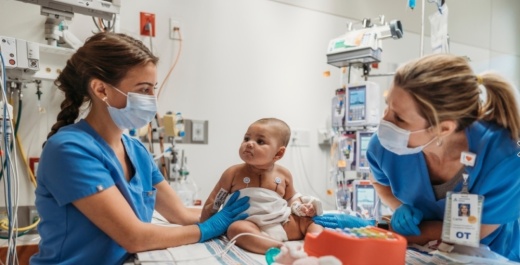Established in 2018, UT Health Austin’s Texas Center for Pediatric and Congenital Heart Disease at Dell Children’s Medical Center, led by Dr. Charles Fraser, is offering children care that families had to travel to Dallas or Houston to receive in years past. Fraser and his team performed the city’s first successful pediatric heart transplant in October 2020.
“We had originally thought that we would wait some years before we started to pursue pediatric cardiac transplantations, but it became quickly obvious that we needed to change that time frame because there were a lot of patients who were presenting to us who could only be helped with a heart transplant,” Fraser said.
The first pediatric patient to receive a new heart at Dell Children’s was 18-year-old Gerardo Ramirez, who was in end-stage heart failure. Since then the heart transplant team has successfully completed three more life-saving surgeries, including a transplant for 6-month-old Zaria Jackson on March 25 after she was kept alive with a device called a Berlin Heart Ventricular Assist Device for two months while she waited for a donor heart.
Though pediatric heart transplants are new to Austin, the heart transplant team at Dell Children’s comes with decades of experience. Fraser has done heart transplants since 1986 and worked alongside many of his fellow surgeons in the past, including Dr. Chesney Castleberry, medical director of the Pediatric Heart Failure and Transplant Program, and Dr. Carlos Mery, the program’s surgical director. These experts, along with anesthesiologists, occupational therapists and others, were drawn to Dell Children’s by its partnership with UT Health Austin and Dell Medical School, Fraser said.
“The whole premise ... was to build a multidisciplinary, dedicated team that doesn’t do anything else [but pediatric heart care]. That sounds simple, but it’s not easy to achieve,” he said. “It takes an enormous commitment on the part of a hospital and a medical school to commit the resources and the support that’s necessary for a large team.”
Fraser said It is worth it to make that commitment: patient outcomes for dedicated teams like the one at Dell Children’s are better overall. The Texas Center for Pediatric and Congenital Heart Disease has had a 1.3% mortality rate across around 1,000 surgeries, many of them high risk. The four patients who received new hearts all remain healthy, according to Dell Children’s.
“I look forward to the day, hopefully soon, when children can get kidney transplants, liver transplants, bone marrow transplants and eventually someday lung transplants,” Fraser said. “All of those are treatments that should be available to children in a great city like Austin.”





